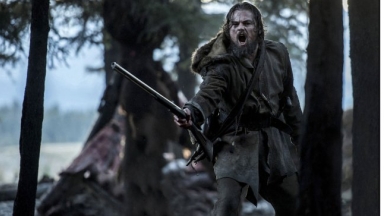
As one of the follicly challenged, I've always had a fellow-feeling with the prophet Elisha.
Time was when I could feel the barber was worth every fiver I paid him. But time, like an ever-rolling stream, has borne most of my hair away, and now I come away feeling vaguely cheated.
We know Elisha was bald because of an incident recounted in 2 Kings 2:23-24. He was on his way to Bethel when some children came out and jeered. "Go on up, you baldhead!" they shouted.
When I was in Sunday school I recall a hapless teacher trying to engage our attention by demonstrating various emotions; curiousity, sadness and so on. He scratched his head and looked puzzled: "What am I doing now, children?" he asked. "Looking for your hair," I answered. His next expression was anger, but I don't think he would have gone as far as Elisha, who cursed the boys in the name of the Lord. Immediately two she-bears came out of the woods and "mauled" 42 of them.
The story foreshadows box-office hit The Revenant, in which Leonardo DiCaprio also comes off second-best in an encounter with an irritable ursine. And it's one of those that's troubled readers and scholars. What is one of God's prophets doing, having bears maul little children? And what is God doing?
So here are some thoughts to bear in mind as we read it.

1. Elisha's baldness may not have been like mine, standard male-pattern. It might have been a sort of tonsure, designed to mark him out as a prophet. So the children weren't mocking his misfortune, but his standing as a prophet.
2. It might be that they were contrasting him with Elijah, his predecessor and mentor and one of Israel's greatest prophets. As it's often translated, 2 Kings 1:8 describes Elijah as "with a garment of hair and with a leather belt round his waist". But the "garment of hair" could also be translated "hairy" – so if Elijah was a "hairy" man, Elisha is being disparaged by comparison. It was a way of saying, "You aren't a patch on Elijah."
3. The words translated "children" in many English Bibles aren't only used for young children. It's also used for youths. We know there were at least 42 of them because that's how many the bears mauled, so they were actually quite an intimidating mob.
4. Having said that, there might not have been that many. Forty-two is a symbolic number associated with death and cursing. In Judges 12:6 42,000 Ephraimites were killed, and in 2 Kings 10:14, 42 relatives of Ahaziah were killed. There were only two bears, and it's actually rather hard to imagine the boys staying around long enough for the bears to get at them.
5. The story doesn't say the bears killed them, just that it mauled or "tore" them. This could mean anything from a serious maiming to a slight scratch.
6. Another reason for the seriousness of their offence might have been their relative ages: if Elisha was naturally bald he would not have been a young man, and however old they were exactly, the boys' youth is emphasised. The Bible is very clear about the honour that should be paid by the young to the old; children should not cheek their Sunday school teachers.
7. Having said all that, it's still perplexing. But we should try to avoid reading the Old Testament as if it were written yesterday. It is profitable for us, but part of that is being puzzled and disturbed by it.
There are many stories in the Bible that throw up serious moral problems for today's readers. The problems can't always be explained away, but sometimes knowing more about the text itself and the times it refers to helps us understand it better.
Follow Mark Woods on Twitter: @RevMarkWoods

















